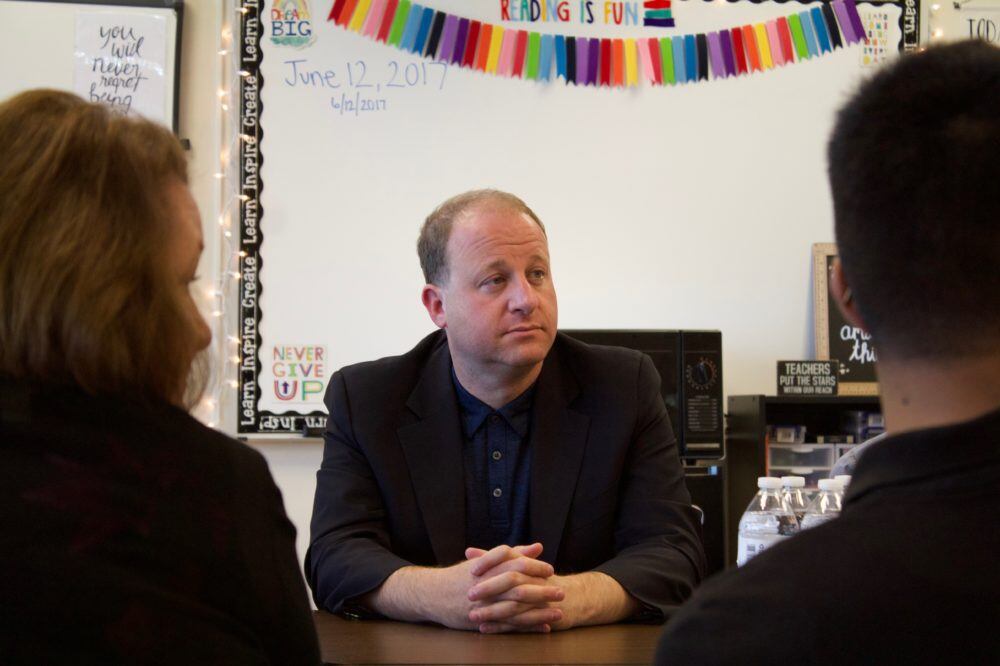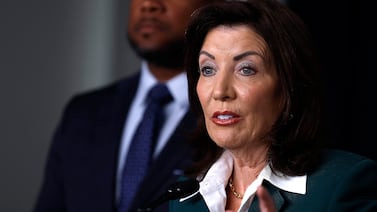Colorado Gov. Jared Polis has publicly and loudly opposed proposed changes to federal rules that could make it harder for charter schools to get start-up grants.
Polis, a Democrat who founded a charter network in Colorado in 2004, wrote a three-page letter to U.S. Education Secretary Miguel Cardona earlier this month listing several concerns. Polis’ letter is notable because while there has been strong opposition to the proposed regulations from Republican governors, Polis is one of few elected Democrats to speak against them.
Polis also penned a Friday op-ed in The Washington Post in which he said the federal education department should go “back to the drawing board” on the changes.
The start-up grant program, Polis wrote, “is the only source of dedicated federal funding to support the growth of high-quality charter schools, and we must ensure the program can meet the clear demand for these life-transforming schools.”
Colorado charter leaders and supporters have reacted with alarm to the proposed rule changes. Declining enrollment and shifting political winds have made it harder to open new charter schools even as charter enrollment grew over the last several years.
The proposed regulations would place more emphasis on the impact of opening new schools, including in areas with declining enrollment. But charter advocates say children and their families deserve options even if there are open seats in traditional public schools.
The comment period for the proposed rule changes has closed. Cardona has disputed that the changes would make it harder for new charter schools to open.
Charter schools in Colorado are publicly funded but privately run by nonprofit groups. More than 15% of Colorado K-12 students attend a charter school, the third highest rate in the nation.
The Colorado Department of Education participates in the federal start-up grant program. New charter schools can apply for funding for onetime startup costs such as equipment or teacher training. Colorado’s most recent award was $55 million to be used between 2018 and 2021, but the state likely won’t spend all that because it hasn’t had enough applicants lately, said Bill Kottenstette, the executive director of the state schools of choice office.
The proposed federal rule changes would require charter schools seeking the grants to meet several new criteria. Among them: Applicants would be required to conduct a community impact analysis to show there is “sufficient demand” for their school and that opening it would not increase racial or socioeconomic segregation in the community. The analysis would be used as part of the criteria to determine which schools get a start-up grant.
Priority would be given to charters that plan to partner with traditional schools or districts.
Polis took issue with proposed priority that charters be racially diverse, arguing that some charters intentionally serve a single population of students that have been traditionally marginalized. In his letter to Cardona, he cited two examples: Kwiyagat Community Academy, a charter school founded by the Ute Mountain Ute tribe in Towaoc, Colorado, and the Robert F. Smith STEAM Academy, a Denver school modeled after historically Black colleges.
But Robert F. Smith STEAM Academy is not a charter school. It is an innovation school, a district-run school with charter-like autonomy. Polis’ Post op-ed only mentions Kwiyagat.
Polis also pushed back on the requirement that charter applicants partner with traditional schools or districts. “If a large district refuses to partner with charter schools, the district would succeed in placing the proposed charter school at a disadvantage for funding,” he wrote. “The focus of this proposal is on bureaucratic inputs, rather than what is best for families.”
Colorado’s largest school district, Denver Public Schools, for many years collaborated with charter schools, sharing buildings and tax money and encouraging the replication of high-performing charters as a school improvement strategy. A quarter of Denver’s approximately 200 public schools are charters, and they serve more than a fifth of the city’s students.
But the district’s attitude toward charters is shifting due to political changes on the school board and declining enrollment. In the past four years, 11 Denver charter schools have closed on their own or announced plans to do so. Most have cited declining enrollment.
At the same time, three new charter schools recently applied to open in Denver. The school board is set to vote soon on whether to authorize them. The vote will happen as the district is grappling with the need to close traditional schools because of a decrease in students.
State law doesn’t explicitly limit the reasons that school boards can reject charter applications, but many interpret the law to mean districts can’t base a denial on enrollment. A bill that would have given districts more grounds for turning down new charters failed last year in the state legislature.
Melanie Asmar is a senior reporter for Chalkbeat Colorado, covering Denver Public Schools. Contact Melanie at masmar@chalkbeat.org.






